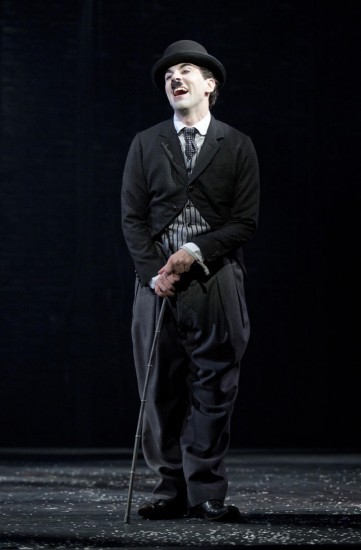
Rob McClure embodies the Little Tramp in new Broadway musical about Charlie Chaplin (photo by Joan Marcus)
Ethel Barrymore Theatre
243 West 47th St. between Broadway & Eighth Ave.
Through February 3, $49.50 – $135.50
www.chaplinbroadway.com
From his Dickensian upbringing to Hollywood stardom to his penchant for underage women and his long exile overseas, followed by a final redemption, Charles Spencer Chaplin lived quite a life, something book writers Christopher Curtis and Thomas Meehan are only partially successful in bringing to the big stage with Chaplin. The new musical, directed and choreographed by Warren Carlyle, glories, perhaps a bit too much, in Rob McClure’s dazzling performance as Chaplin, embodying the multitalented actor, writer, director, musician, composer, political rebel, and womanizer whose socially relevant silent comedies brightened up hard times in America during the 1920s and 1930s. The show starts in London, as young Charlie (a charming Zachary Unger) grows up in the seedy alleys and burlesque clubs with his mother, Hannah (an outstanding Christiane Noll), a bawdy performer whose husband has essentially abandoned the family. An older Charlie soon catches a break and is working for Mack Sennett (a strong Michael McCormick) in Hollywood; the scene in which Charlie is ordered to be funny and transforms into the Little Tramp is splendidly done, adding a deft touch of magic to the invention of this seminal character. Hiring his brother, Sydney (Wayne Alan Wilcox), as his business manager, Charlie finds massive success with such films as The Kid, The Gold Rush, and The Circus, but the musical oddly chooses which to focus on; while Carlyle does a good job equating The Kid with Chaplin’s real-life experiences as a child (clever casting has Unger also playing Jackie Coogan), shorter (or stranger) shrift is given to such critical works as City Lights and Modern Times, and later films such as Monsieur Verdoux and Limelight warrant nary a mention, despite their many inside references to his personal situations.
The musical does, however, devote a major sequence to The Great Dictator that reveals the development of his public political persona. But in the second act, Chaplin spends way too much time concentrating on Hedda Hopper’s (Jenn Colella) mission to destroy Chaplin by labeling him a communist in order to get even for his refusal to be interviewed by her. And the musical deals with Chaplin’s ultimately disastrous marriages to Mildred Harris (Hayley Podschun), Lita Grey, and Paulette Goddard in a baffling boxing scene that sideswipes the show, while his relationship with Oona O’Neill (Erin Mackey) swoops in from nowhere and then essentially disappears. Beowulf Boritt’s sets, Amy Clark and Martin Pakledinaz’s costumes, and Ken Billington’s lighting, along with Jon Driscoll’s inventive video projections, give Chaplin the look and feel of a black-and-white movie, but few of the songs stand out, aside from Noll’s “Look at All the People” and the ensemble piece “Just Another Day in Hollywood.” Much like Chaplin’s career, Chaplin kicks off with quite a bang but eventually dissipates into the disappointment of what could have been.